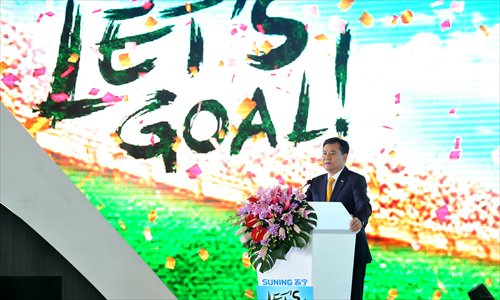HOME >> BUSINESS
Suning scores deal for Jiangsu Guoxin-Sanity soccer team
By Wang Cong Source:Global Times Published: 2015-12-22 20:48:01
Investment, policies to broaden field for nation’s players: analysts

Zhang Jindong, chairman of Suning Commerce Group Co, speaks Monday at a briefing meeting about the newly acquired soccer club in Nanjing, capital of East China's Jiangsu Province. Photo: CFP
Chinese soccer might not rank highly on the global playing field, but it's a growing industry with great prospects, analysts said Tuesday in response to the latest corporate investment in the soccer sector.
Suning Commerce Group Co, a leading domestic home appliance retailer, announced Monday that it acquired the Jiangsu Guoxin-Sanity Football Club from Guoxin Investment Group for 523 million yuan ($80.75 million).
Suning, which has been a major sponsor of the team, promised to make further investments to improve the team's management, operations and facilities, and maintain the team's competitiveness in domestic and Asian fields. The team is currently ranked No.9 in the Chinese Super League.
The acquisition was an obvious choice for the retailer given its strategy of diversification, Suning Chairman Zhang Jindong told a press conference Monday in Nanjing, capital of East China's Jiangsu Province.
Zhang said that as Suning moves to broaden its business portfolio, soccer is becoming a key component of its plan to build an "Internet plus sports" model. Moreover, the sports sector's marketing strategy is in line with Suning's branding plans, which will be Internet-based and target young consumers, he said.
The investment is not only in line with Suning's long-term strategy, it could also yield short-term profits for the retailer through broadcast rights fees, said Zhang Jiayuan, an analyst at China Investment Consulting Co.
Zhang, the analyst, told the Global Times on Tuesday that Suning's move is one of many investments in the soccer sector by some of China's richest businessmen.
In 2014, e-commerce conglomerate Alibaba Group Holding, led by founder Jack Ma Yun, paid 1.2 billion yuan for a 50 percent stake in what was then known as the Guangzhou Evergrande Football Club. The stake was acquired from real estate tycoon Xu Jiayin's Evergrande Group, which bought the team in 2010.
Wang Jianlin, chairman of Dalian Wanda Group - who Forbes magazine ranked as China's richest person this year - has invested millions in soccer in China and overseas. In 2011, Wang agreed to give 500 million yuan over a three-year period to the China Football Association to finance the training of young Chinese soccer players in Europe.
Ma and Wang say they're big soccer fans, but analysts said the investments are more than just a hobby.
The giant cultural and media industry behind soccer was the main motivation for Alibaba, Wanda and Suning, said Ji Ning, a Beijing-based sports marketing analyst.
Ji told the Global Times on Tuesday that the trend would continue and the soccer industry would see more such investment in the coming years. That money could help the nation's soccer teams improve their weak standing on the world sports stage, he noted.
China's men's soccer team is No.84 in the FIFA world rankings in December. And China only qualified for the World Cup once, in 2002. This unimpressive performance has left the nation's soccer fans fuming, and it's even drawn the attention of China's top leaders, including President Xi Jinping.
Xi, a big soccer fan, has mentioned the development of soccer in China on multiple occasions. In October, Xi said China would deepen reforms of the country's professional soccer system, speed up the development of youth soccer and enhance international cooperation to expand the sport in China.
In March, the State Council, China's cabinet, released a proposal for reforms in the soccer industry, which included putting the sport into the nation's economic and social development plan, news portal chinanews.com reported on March 16.
The proposal set goals for China such as hosting the World Cup, improving the competitiveness of the men's national team and building a world-class team. It also encouraged more companies, especially private companies with a modern management model, to invest in soccer.
On Friday, Cai Zhenhua, president of the Chinese Football Association (CFA), said at a CFA meeting that the long-term objective for the Chinese men's team is to reach the top 16 at the World Cup in one or two decades.
Zhang said that with increasing support from corporate investment and government policies, the sport will thrive commercially and competitively.
But getting results will take some time, Ji said.
Posted in: Companies